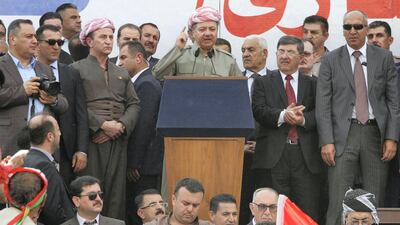On Monday, Kurdistan Region, the only autonomous area in Iraq, will hold a referendum on the question of independence. The vote will have no legal force. Its purpose is to fortify the argument for eventual independence by demonstrating that self-determination enjoys popular support. The plebiscite has been decreed illegal by the Iraqi government, and the governments of Turkey, Iran, Britain and the United States have all urged the Kurdish Regional Government to scrap it.
Yet Massoud Barzani, the region's president, refuses to budge. He has lavished vast sums of cash on Washington lobbyists to advance the case for the referendum. Closer to home, he has disregarded or derided regional protests and thumbed his nose at the government in Baghdad. Mr Barzani insists that the referendum is for the good of the Kurdish people. This claim falls apart on closer inspection. The Kurdish yearning for sovereignty is a long one, but the region controlled by Mr Barzani is only one part of the "Greater Kurdistan" that nationalists hope one day to erect.
___________________________
More from Opinion on the Kurdish referendum
The genie of Kurdish independence will be hard to put back in the bottle
From Kirkuk to Catalonia, referendum votes leave much to be desired for those after autonomy
Cartoon: Shadi Ghanim's take on the Kurdish referendum
___________________________
Mr Barzani's insistence on conducting a referendum in his bailiwick will likely have the effect of frustrating rather than accelerating the creation of such a state. The autonomy that has allowed Iraqi Kurds to build a proto-state will be imperilled by the retaliatory measures that Mr Barzani's referendum will invariably trigger. Turkey and Iran, trying to contain Kurdish secessionist sentiment within their own borders, will look for ways to choke off what they regard as the fount of incitement. The Iraqi government, having shed blood to make gains against ISIL, is not too keen either to indulge Mr Barzani's destabilising theatre. Mr Barzani is threatening to redraw Iraq's map just as the country is beginning to unite after years of strife.
The question of what constitutes Iraqi Kurdistan is a matter of dispute. Millions of Iraqi Arabs live alongside Kurds in areas claimed by Mr Barzani. Baghdad owes them the responsibility that all states owe their citizens; to allow Mr Barzani to claim their lands is to abdicate its fundamental duty to defend Iraqis. So why is Mr Barzani going ahead with the referendum in spite all these problems? Strengthening his own hold on power, rather than leading his people to some promised land, is the true reason for this referendum. Iraqi Kurdistan is a museum of disappointments. Unfinished buildings dot the landscape. Government employees complain about unpaid wages. Everyone complains about mismanagement by the government.
In 2015, Mr Barzani junked the constitution and stayed in power even after his term in office ended. This referendum’s true purpose is to weaken his rivals in the Patriotic Union of Kurdistan party and make gains in the parliamentary and presidential elections scheduled to take place on November 1. Mr Barzani has decided to subordinate the good of his people to his own ambition. The Kurdish people will be the true losers of Monday’s referendum.
Follow The National's Opinion section on Twitter

